In this article:
Glycerin is celebrated for its skin-enhancing properties, but it can be beneficial for your hair too! The daily onslaught of pollutants, UV radiation from the sun, heat from hairstyling tools, and chemical irritants in shampoos and conditioners can damage and dry out the hair.
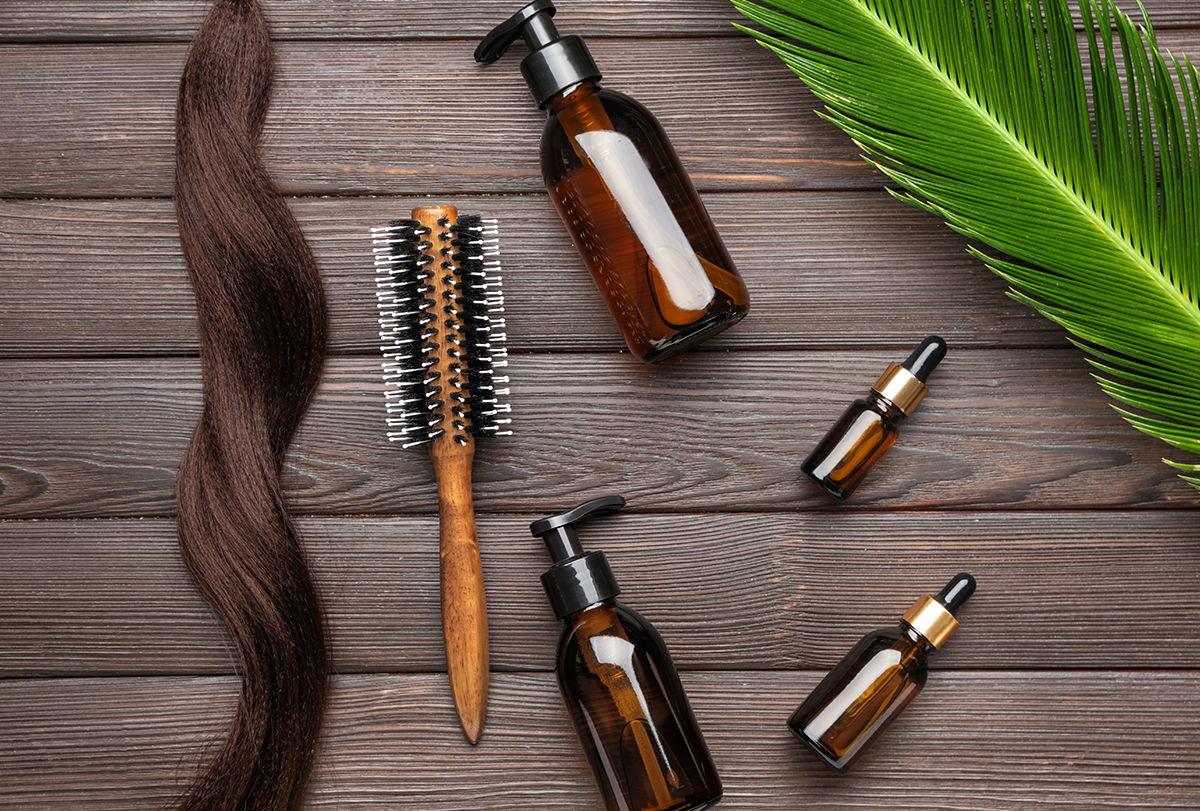
Glycerin is one ingredient that is often used in hair products to moisturize, repair, and protect your precious tresses. But these products often come with added fragrances or lathering agents that can be harsh on your hair, thus diminishing the positive effects of glycerin. Some of the major irritants include sulfates, formaldehyde, and parabens.
Meanwhile, the products that claim to be chemical-free usually fall within the high price range. Do yourself a favor and learn to make all-natural hair repair masks at home using nourishing ingredients such as glycerin.
Glycerin and Cosmetics
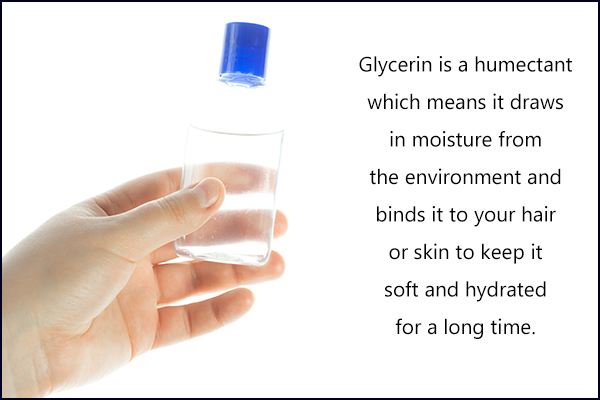
Glycerin, glycerol, or glycerine is essentially a combination of alcohol and sugars that is synthesized from petroleum in a lab or extracted from plant and animal sources.
Vegetable glycerin comes from palm, coconut, and shea butter, whereas animal-based glycerin comes from animal fats. This clear, odorless liquid has a viscous consistency but is soluble in water.
Glycerin is credited with a wide range of therapeutic properties that can improve the quality of your hair and skin. No wonder it is a common ingredient in a variety of hair and beauty products. For starters, glycerin is a humectant, which means it draws in moisture from the environment and binds it to your hair or skin to keep them soft and hydrated for a long time.
Glycerin is also widely used in the preparation of herbal extracts (1) and exhibits strong antimicrobial activity to ward off infections. Other reasons for using glycerin in cosmetics and personal care items include the following:
- It works as a mild denaturant that is readily absorbed and removes excessive greasiness for a mattifying effect, but unlike other denatured alcohols, it does not irritate the skin.
- It conditions your hair.
- It forms a protective layer over the skin or hair to fight moisture loss and external irritants.
- It is effective as a viscosity-decreasing agent.
- It helps preserve and promote oral health. (2)
Note: Glycerol, glyceryl alcohol, glycerolum, glycerate, and glyceryl monostearate are all different names for glycerin. So, if you are allergic to glycerin, look out for any of these in the ingredients list.
Hair Benefits of Glycerin
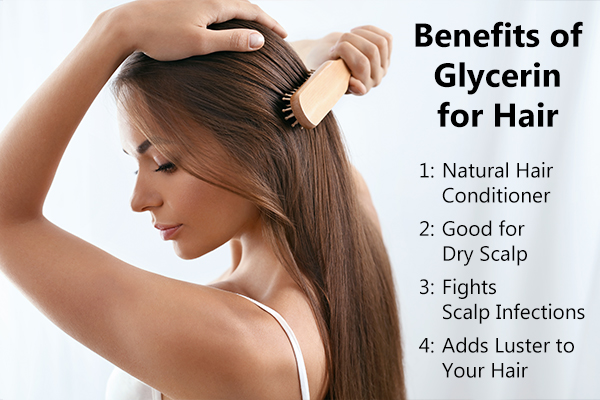
Glycerin is especially useful for managing thick, frizzy, or curly hair due to the following properties:
1. Natural hair conditioner
Being a natural humectant, glycerin traps moisture from the air and locks it in your hair shaft to provide deep and long-lasting lubrication. (3)(4)(5)(6)
Well-hydrated hair is less prone to breakage and split ends, in addition to being more manageable. Dry hair, on the other hand, easily turns brittle. But you have to be mindful of the weather when using glycerin as a hair conditioner.
If the air is dry as during winters or in arid terrains, the humectant will not get any moisture from the environment and will start extracting moisture from your hair itself, leaving it drier than before.
Conversely, if the air is too moist as during monsoons or in humid terrains, the humectant will pull excessive moisture from the environment and will make your hair extremely puffy.
2. Good for dry scalp
Glycerin penetrates not just your hair but also deep into the scalp to moisturize it. This topical hydration helps heal and strengthen the skin barrier in the scalp. (7)(8)
Dry scalp is prone to flaking and irritation, which can be relieved through the hydrating and cooling effects of topical glycerin. Glycerin also helps maintain a healthy scalp pH, which is conducive for hair growth but hostile for microbial growth.
3. Fights scalp infections
Glycerin works as a potent antimicrobial agent that helps disinfect your hair and scalp. (9) In fact, it is often used in leave-in conditioners that are designed for treating scalp infections such as dandruff. (10)
4. Adds luster to hair
Glycerin nourishes and hydrates your hair to make them strong and shiny. The best part is that glycerin offers all these hair benefits without the risk of any side effects, unless you are allergic to it.
Ways to Use Glycerin for Hair
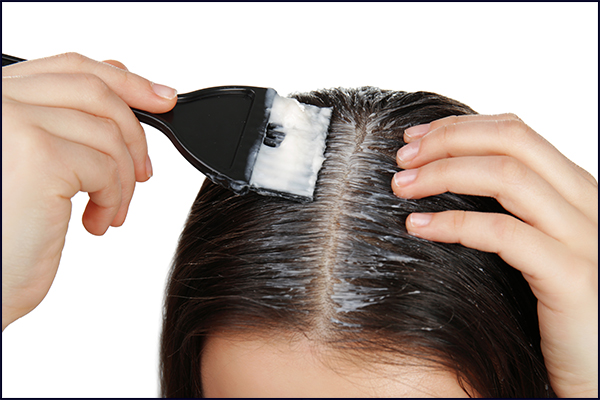
Here are some easy glycerin-based remedies for hair care and repair:
- Simply apply glycerin to your hair, but only after diluting it with water or a carrier oil such as coconut, olive, or jojoba oil. This is because glycerin at its original concentration is very thick and can make your hair sticky, oily, and heavy. Some people recommend mixing it with castor oil, which is quite greasy itself, so this may not be a good idea.
- Prepare a moisturizing hair mask by mixing glycerin with aloe vera or honey and adding a tablespoon of plant oil such as olive, jojoba, or coconut oil if you want.
- Pair glycerin with yogurt to treat oily or itchy scalp.
- Apply glycerin mixed with eggs to your dull, damaged hair for some much-needed shine.
- Make your own hair spray with glycerin, rose water/onion juice, and essential oils such as peppermint or lavender. Simply mix equal parts rose water and glycerin, add 2–3 drops of your preferred essential oil (optional) to the solution, and then pour the liquid into a spray bottle. Apply this spray on damp or dry hair as needed.
Safety Concerns Over Glycerin
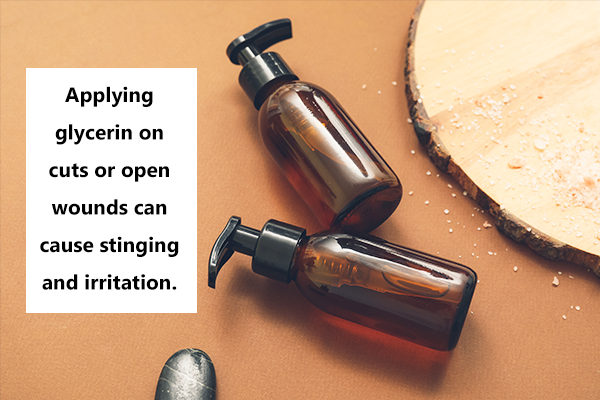
Glycerin can safely be applied to your skin and hair, (2) unless you are allergic to it. So, it is imperative that your conduct a patch test before starting its topical use.
Other precautionary points to bear in mind when using glycerin include the following:
- Applying glycerin on cuts or open wounds can cause stinging and irritation.
- Treating your hair with topical glycerin during arid weather can further dry it out.
- Treating your hair with topical glycerin during humid weather can render it extremely puffy and hard to manage.
- Applying glycerin to your hair just before using a hairstyling tool enhances the intensity of the heat and may burn your hair. If you apply glycerin immediately after, it will trap the heat released from the device and damage your hair from within.
- If you have a naturally oily scalp, avoid using glycerin on your hair as it can add to the greasiness.
Final Word
Glycerin can be used in different ways to tackle different hair problems. The success of glycerin in improving hair health is evident from its wide-scale usage in hair products.
The market is flooded with shampoos, leave-in conditioners, hair serums, hair masks, and other hair cosmetics whose star ingredient is glycerin. But these commercial products often come with harmful chemicals such as parabens, formaldehyde, isopropyl or propanol alcohol, and sulfates, which can greatly damage and dry out your hair in the long run. Thus, the negative effects of the chemical irritants overpower the positive effects of glycerin.
You can avoid this dilemma by making your own hair products at home with all-natural ingredients, including glycerin. This article has listed many easy ways to incorporate glycerin into your hair care regimen, but consistent usage is the only way to ensure good results.
Besides, no single ingredient can transform your hair quality by itself. So for glycerin to truly work, it must be used as part of a holistic hair care routine and coupled with a healthy diet and lifestyle.
- Was this article helpful?
- YES, THANKS!NOT REALLY


